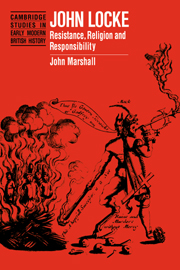Book contents
- Frontmatter
- Contents
- Acknowledgements
- List of abbreviations
- Introduction: Locke's intellectual development
- PART I RELIGION AND THE POLITICS OF TOLERATION
- 1 Against the ‘tyranny of a religious rage’
- 2 Restoration churchmanship and the ‘Essay on Toleration’
- 3 Undermining the temple of worship of priest and prince
- 4 The theology of a reasonable man 1667–83
- PART II RESISTANCE AND RESPONSIBILITY
- PART III HERESY, PRIESTCRAFT AND TOLERATION; JOHN LOCKE AGAINST THE ‘EMPIRE OF DARKNESS’
- Conclusion
- Bibliography
- Index
- Cambridge Studies in Early Modern British History
1 - Against the ‘tyranny of a religious rage’
Published online by Cambridge University Press: 07 January 2010
- Frontmatter
- Contents
- Acknowledgements
- List of abbreviations
- Introduction: Locke's intellectual development
- PART I RELIGION AND THE POLITICS OF TOLERATION
- 1 Against the ‘tyranny of a religious rage’
- 2 Restoration churchmanship and the ‘Essay on Toleration’
- 3 Undermining the temple of worship of priest and prince
- 4 The theology of a reasonable man 1667–83
- PART II RESISTANCE AND RESPONSIBILITY
- PART III HERESY, PRIESTCRAFT AND TOLERATION; JOHN LOCKE AGAINST THE ‘EMPIRE OF DARKNESS’
- Conclusion
- Bibliography
- Index
- Cambridge Studies in Early Modern British History
Summary
John Locke was baptised into the Church of England at Wrington in Somerset in 1632. He was almost certainly brought up as a Calvinist. His family seem to have been Anglican communicants in the 1630s and presbyterians at the time of the establishment of presbyterian classes in Somerset in 1647. Like almost all of those with presbyterian sympathies up to the Restoration, his family very probably did not believe in the significant but still very limited degree of religious toleration that was supported by such sects as Independents as a ‘liberty of conscience’ – a ‘toleration’ which excluded at least all those people that these groups defined as ‘heretics’, ‘blasphemers’ and ‘idolators’ and as therefore unable to claim ‘conscience’. Locke's family and their friends probably instead believed with most presbyterians that there should be one uniform church in the nation, with the devolution of some disciplinary powers from bishops to presbyters and significant revisions of the liturgy to reduce the similarities to Roman Catholic forms of worship which had been retained during the sixteenth-century English Reformation.
Locke's paternal grandfather Nicholas Locke had bequeathed money for weekly Bible lectures, a form of bequest that was often an indication of Calvinist beliefs. Locke's father, John Locke senior, served on the Parliamentarian side in the Civil War in 1642 and 1643 in the troop of his patron Alexander Popham.
- Type
- Chapter
- Information
- John LockeResistance, Religion and Responsibility, pp. 3 - 32Publisher: Cambridge University PressPrint publication year: 1994



